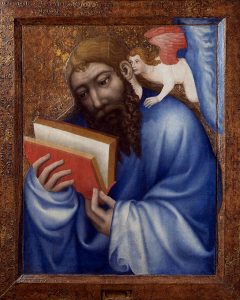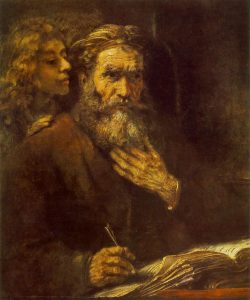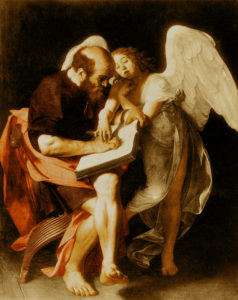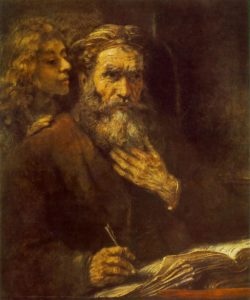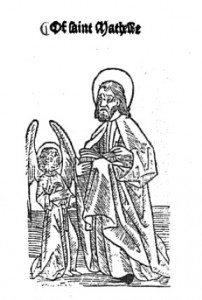Thoughts on Sunday’s Lessons for Sept. 19, 2021
First Reading (Track One): Proverbs 31:10-31
This reading, our third and last in a brief series from the Book of Proverbs, seems to express an ancient, patriarchal view of woman’s subsidiary role in the household.
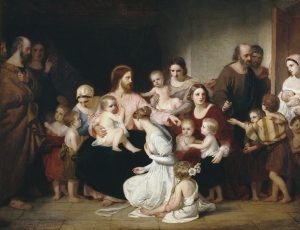
Christ Blessing the Little Children (1839), oil painting on canvas by Charles Lock Eastlake (1793-1865). Manchester Art Gallery, England. (Click image to enlarge.)
Needless to say, we should understand the patriarchal language in both testaments as a signal of ancient time and culture, not as guidance for the modern world. Pay attention to these verses, though, and you’ll discover that this capable wife is no shrinking, helpless figure. She has her husband’s trust; she supervises the household servants as she buys goods and food for the family and even purchases farm and vineyard fields. She is strong, brave, wise and kind. Her husband and her children praise her. “Let her works praise her in the city gates,” indeed!
First Reading (Track Two): Wisdom of Solomon 1:16-2:1, 12-22
Both good behavior and bad behavior have consequences. Righteousness is pleasing to God; evil deeds lead to death. We hear this theme in Sunday’s readings. First up is this passage from the book of Wisdom, which is traditionally attributed to King Solomon but was actually written in Greek in the last centuries before Christ. These verses present the ungodly, arguing why they choose to persecute the righteous people who look down on them. They are wrong, of course, as the verses at the beginning and end of the passage make clear: They don’t understand God’s purpose, nor do they recognize the rewards of a blameless life.
Alternate First Reading (Track Two): Jeremiah 11:18-20
Jeremiah is often called “the Weeping Prophet” for his loud lamentations. He shouts out to warn the leaders of Jerusalem and Judah that their failure of righteousness and justice is going to bring down God’s wrath in the form of defeat, destruction and exile. In this brief passage, though, his weeping becomes more personal: He has learned that those leaders, angered by his prophecies, are scheming to kill him. He feels like a gentle lamb led to slaughter, he laments; but even in the face of enemies he remains committed to God.
Psalm (Track One): Psalm 1
We sang Psalm 1, the first of the 150 Psalms, not long after Easter. Now we return to it again as summer turns to autumn. In its verses we celebrate those who follow in the way of God, who delight in God’s teaching and meditate on it. These faithful souls will be happy, the Psalmist tells us. They will become as firmly rooted in faith as are trees deeply rooted by running water, gaining strength and bearing fruit. The wicked, in contrast, can count on no such happy end. Those who do not follow in God’s way will be blown away like chaff in the wind.
Psalm (Track Two): Psalm 54
This Psalm, attributed by tradition to King David, recalls a time when the young David had to flee in terror from an angry Saul who sought to kill him. This narrative resonates with the reading from Wisdom: When insolent and ruthless enemies seek our lives, God’s laws will not hold them back. This is a time to pray, the Psalmist says. Now is the time to call on God, who delivers us from trouble and upholds our lives.
Second Reading: James 3:13-4:3, 7-8a
Picking up where last week’s reading from James left off, the author expands on the theme of using our tongues – tiny yet powerful instruments that they are – to praise and bless, not to poison. These verses contrast the wisdom that comes from above against the envy and ambition in our hearts. The writer calls us to show our gentle, wise works in the form of good lives, rather than engaging in earthly, unspiritual ambition and boasting. Resist evil, we are told. Draw near to God, and God will draw near to us.
Gospel: Mark 9:30-37
Sometimes the Apostles seem almost ridiculous in their cluelessness. Today Jesus tells them for a second time that he must suffer, be rejected, killed and then rise again. Not only do they still not get it, but they are afraid to ask. Did they think long and hard about this? Apparently not. Rather, they got off to themselves and argued about which of them was the greatest. Jesus, who must have been thoroughly exasperated, showed them a small child. Following Jesus is not about greatness and power, he said. It is about welcoming the smallest and weakest among us.
